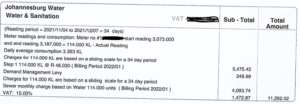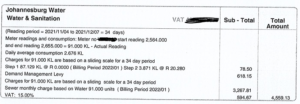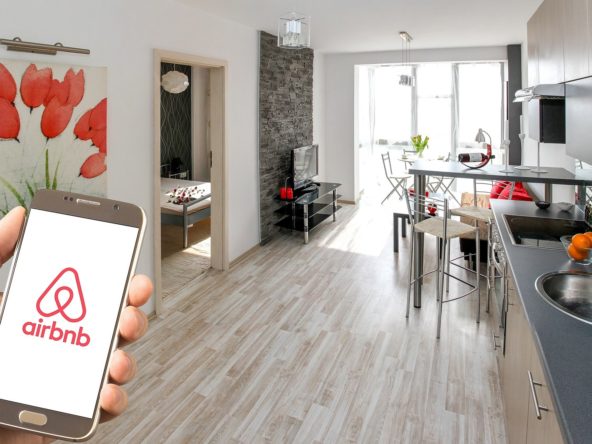Water quality and availability and is a growing concern for South African property owners, with rising costs, low water quality and many suburbs running dry.
For investment property owners, reliable water access is not just a convenience, it’s a factor that can significantly impact your bottom line and tenant satisfaction.
One potential solution?
Installing a borehole on your investment property.
This is exactly what we did recently on an investment property we bought in 2023.
Why Add A Borehole
In 2023 we bought a block of 13 residential flats and 3 retail shops (made of two stands).
One of the issues we picked up during our due diligence of the property was that the owners water bill was extremely high.
We found it odd and upon asking the owner he mentioned that the City of Joburg was not billing him correctly for years.
So while he should have been paying alot less he was being billed about R16,000 per month.
Our solution to this problem was that if we added a borehole to the property the money being paid to the Council (approx. R16,0000) would go to our bottom line. So while we would not collect money for the water, we saved R16,000 by adding the borehole.
The previous owner was paying for the water from the rental collected.
The decision was easy.
II. Benefits of a Borehole for Investment Properties
Having a borehole on your investment property offers a range of advantages that can benefit both your wallet and your tenants.
Let’s at some of these benefits:
- Reduced Expenses: Municipal water bills can be a significant ongoing cost for investment properties. Boreholes offer access to a free, natural source of water, drastically reducing your reliance on municipal supplies. This translates to long-term savings that can significantly improve your property’s overall yield.
-
Consistent Water Supply: Municipal water supplies can be disrupted (as we have seen recently across the country) due to infrastructure problems, scheduled maintenance, or water restrictions during droughts.
A borehole provides a reliable, independent source of water, ensuring your property isn’t left without this essential resource. This uninterrupted water supply is particularly beneficial for:
- Tenants: Consistent water access improves tenant satisfaction and can potentially command higher rent.
- Landscaping: Maintaining a healthy, lush garden with borehole water enhances the property’s curb appeal, attracting potential tenants and increasing its value.
-
Increased Property Value: Boreholes are a valuable asset for any property, especially in water-scarce regions. When you sell your investment property, having a borehole can be a major selling point for potential buyers who value water availability and lower running costs.
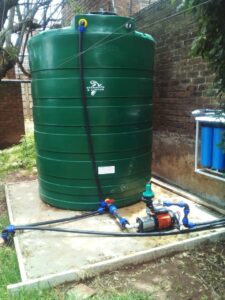
III. The Process of Installing a Borehole: A Step-by-Step Guide
Installing a borehole on your investment property might seem like a complex undertaking, but with careful planning and professional guidance, it can be a smooth process.
Here’s a detailed breakdown of the steps involved:
A. Initial Considerations:
- Legal Requirements: Before embarking on any drilling activity, it’s crucial to understand the legal requirements in your area. South Africa’s Department of Water and Sanitation (DWS) regulates borehole drilling. A permit is mandatory before any drilling commences. You can find permit application information on the DWS website (https://www.dws.gov.za/). Most borehole installation companies can do this for you.
- Property Zoning and Restrictions: Restrictions on borehole drilling may exist based on your property’s zoning. These can be related to environmental concerns or limitations on water usage in certain areas. Contact your local municipality or a qualified hydrogeologist to determine any zoning restrictions that might apply to your property.
Note that if the borehole is on your land, you will not need a permit.
This means that the borehole is within the walls and boundaries of your property.
If drilling on a pavement, but the pavement is part of the building but externally available to the public, then you will need a Joburg Roads Agency permit.
Depending on the municipality you need to apply for a borehole or let them know you have one.
B. Site Assessment:
Not all locations on your property are equally suitable for borehole drilling.
Here’s where a professional hydrogeologist comes in.
A hydrogeological survey is a crucial step that involves:
- Geophysical investigation: The hydrogeologist might use techniques like electrical resistivity surveys or seismic surveys to map the subsurface geology of your property. This helps identify areas with potential groundwater reserves.
- Analyzing existing data: They’ll also analyze existing borehole data from surrounding properties (if available) to understand the local groundwater conditions.
- Considering surface features: The hydrogeologist will take into account factors like drainage patterns, existing structures, and potential sources of contamination to determine the optimal drilling location.
By conducting a thorough site assessment, the hydrogeologist can significantly increase the chances of a successful borehole and ensure it meets your water needs.
C. Drilling and Installation:
Once the ideal drilling location is identified, the actual drilling process begins.
The chosen drilling method will depend on the type of rock formations encountered at your site. Here are two common methods used in South Africa:
- Rotary drilling: This method is suitable for most geological formations and uses a rotating drill bit to break through the rock. It’s a versatile option and often the preferred choice for residential boreholes.
- Hammer drilling: This method employs a hammering action to penetrate hard rock formations. It’s typically used for deeper boreholes or when encountering very hard rock layers.
D. Pump Selection and Installation:
With the borehole drilled, a pump needs to be installed to extract the groundwater. The pump selection depends on several factors:
- Water depth: The depth of the water table in your borehole will determine the type of pump needed. Submersible pumps are placed directly in the borehole, while surface pumps are located above ground.
- Water usage needs: The pump’s capacity should be chosen based on your anticipated water usage. Consider the number of tenants, irrigation requirements for the garden, and any other water needs the borehole will serve.
Following pump installation, the borehole will likely be lined with a casing to prevent contamination and ensure the structural integrity of the borehole.
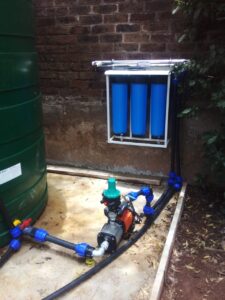
VI. Conclusion: A Sustainable Investment for Your Property
A borehole offers a range of benefits for your South African investment property. From reducing reliance on municipal water to enhancing your property’s value and tenant satisfaction, a borehole can be a strategic and sustainable investment.
Remember, consulting with qualified professionals throughout the process is key.
- Seek Expert Guidance: A hydrogeologist can guide you through the site assessment and advise on the optimal drilling location. A reputable borehole drilling company will ensure proper permitting, drilling techniques, and pump selection based on your specific needs.
- Long-Term Benefits: While the initial investment in a borehole exists, the potential for long-term cost savings, increased property value, and water security makes it a compelling option for many South African property owners.
By carefully considering the information presented here and consulting with qualified professionals, you can determine if a borehole is the right choice for your investment property.

VI. Take Action: Find a Reputable Borehole Drilling Company
Having a borehole installed on your South African investment property can be a rewarding experience, but choosing the right drilling company is crucial. Here’s how to get started:
- Gather Information: Research borehole drilling companies in your area. Look for companies with experience in your specific region and geological conditions.
- Compare Credentials: Verify that the companies you consider are registered with the South African Drilling Contractors Association (SADCA) (https://www.sadca.org/Pages/Home.aspx). SADCA membership indicates the company adheres to industry best practices and safety standards.
- Request Quotes: Contact shortlisted companies and request quotes for your project. Ensure the quotes detail the drilling method, estimated borehole depth, pump specifications, and any potential additional costs like water quality testing or casing installation.
- Ask Questions: Don’t hesitate to ask questions about the drilling process, expected timelines, and warranty information. A reputable company will be transparent and happy to address your concerns.
By following these steps and conducting thorough research, you can find a qualified and reliable borehole drilling company to transform your investment property into a water-secure, profit making asset.

Aslam is from Johannesburg, South Africa and graduated with a BComm degree from the University of South Africa and followed that up with a BComm Hons degree in Finance and Investments.
He has spent over 18 years in the financial services sector, with 12.5 years in the commercial property finance arena with 3 of the major banks in the country.
His specialty being deal structuring and finance solutions for commercial property investors and developers across the commercial property sector, including large scale retail developments, high density residential investments , industrial and office property.
Aslam was also a fast food franchise investor for 7 years, is experienced in digital marketing and online lead generation and has owned and managed multiple residential properties.



